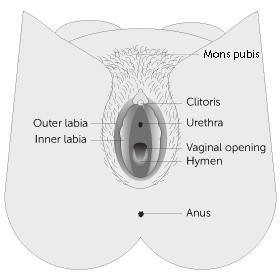You may be confused by the feminine hygiene products that claim to keep your vagina smelling like “springtime.” Caring for your vulvar and vagina is actually very simple because you don’t need to buy fancy soaps or liquids. In fact, these products can be very irritating and can cause vaginitis.
First, let’s review the female structures located on the outside of a female’s body.
The vulva includes the female genitals that are located on the outside, but near the opening of the vagina (see diagram below).

- Mons pubis or “mons” (the mound of tissue above the pubic bone that is usually covered with pubic hair)
- Clitoris (located above the vagina and typically feels good when it is touched. The clitoral “hood” is a small piece of skin that covers the clitoris)
- Urethra (opening to the urinary canal, where urine/pee comes out)
- Labia majora (larger pads of skin on either side of the vagina, protects the vagina from injury)
- Labia minora (thinner flaps on either side of the vagina, sometimes called “lips”)
- Anus (opening to the rectum, where bowel movements come out of)
The vagina is a tube or canal made of tissue and muscle on the inside of a female’s body that is connected to the cervix, which is attached to the uterus.
How Can I Keep My Vulva and Vagina Clean?
- When showering or bathing, wash your vulva with warm water and mild or unscented soap. Make sure the water isn’t too hot and remember to rinse off all the soap.
- Separate your labia and let the warm soapy water clean all around the clitoral hood and between your labia. This will rinse off any secretions that get stuck in between skin folds.
- Rinse completely and pat dry your vulva with a soft dry towel.
- In between baths or showers, you may wish to use a facecloth or a “peri-care” bottle to clean your vulva. This plastic bottle holds water and is also good to use during your period. You can usually find them at your local pharmacy for about a dollar or less.
- While on your period, change your tampon/pad often.
- The vagina cleanses itself naturally. The cells in the vagina keep it at a normal pH so you should NEVER douche or use any sprays in your vagina (unless your health care provider prescribes it).
- Use mild soap and warm water to clean around the opening to your vagina.
Vaginal and Vulvar Hygiene Tips:
- Wash all new underwear before you wear it and then use a small amount of mild unscented detergent for routine washing. Rinse laundry well or use the extra rinse cycle on your washing machine to remove all of the detergents.
- Wear underwear with a cotton crotch. Avoid wearing thong-style underwear as they can irritate your vulva.
- NEVER douche or use feminine deodorant sprays, bubble bath, wipes, bath oils or other perfumed products on your vulva or in your vagina as they can cause irritation, allergic reactions, or remove the natural fluid that keeps your vagina clean. These products are NOT necessary and may be harmful.
- Avoid tight-fitting clothing.
How Do I Know My Vagina is Healthy?
Every female has a natural vaginal scent that can change throughout her menstrual cycle. Normal vaginal discharge is usually clear, white, light yellow and sometimes sticky. Your vagina and vulva area are usually healthy if you do NOT have an odor that is different for you or fishy smelling, itchiness, redness, or burning. It is important to know that some vaginal infections such as gonorrhea and chlamydia can cause no symptoms.
How Do I Know if I Have a Vaginal Infection?
If you have a discharge that smells different for you, your vagina or the area around it is itchy, red or sore, you should make an appointment with your health care provider and get treated. Not all vaginal odors are caused by an infection. Poor hygiene (not washing your vulva/vagina regularly with warm water and soap) can cause an unpleasant smell. Wearing tight-fitting clothing or underwear made of nylon that doesn’t breathe can cause sweat and bacteria to get trapped which can also cause an unpleasant odor.


















